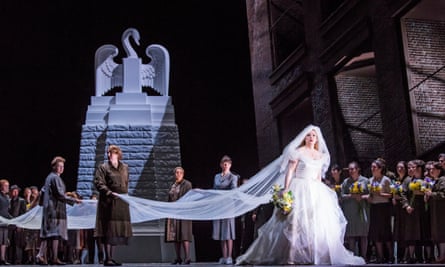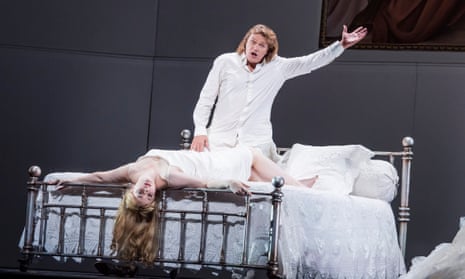It’s 41 years since the Royal Opera introduced a new Lohengrin. That production, directed by Elijah Moshinsky and last seen in 2009, was a largely traditional affair, crammed with dark-ages Christian and pagan symbolism reflecting the strange mixture in Wagner’s libretto. Its replacement, directed by David Alden (his second new Covent Garden show of the season, after last autumn’s Semiramide), takes a very different line. Paul Steinberg’s designs and Gideon Davey’s costumes suggest a relocation to the first half of the 20th century, somewhere in central Europe. The skewed brick facades of the modular set, with their gaping windows and steel gangways and girders, imply a country ravaged by war and a society teetering on the brink of totalitarianism, a threat that becomes vividly real before the end of the opera.
For Alden, it’s all about power politics – the story of an enfeebled king, so desperate to assert his authority that he wears his crown throughout, who sees the arrival of Lohengrin as the answer to his expansionist prayers and the means of turning around the fortunes of his beaten army. To King Heinrich, Elsa’s fate and, to some extent, the machinations of Ortrud and Telramund are subsidiary. Perhaps Ortrud’s invocation of the dark arts sits rather uneasily in this modern militaristic world, and there’s little symbolism here, except for the eruption of flags in the final scene, all emblazoned with a swan, which has become a fascist emblem. The only references to Christianity are the unavoidable ones in the text, while the famous wedding march at the beginning of the third act is wryly sent up on stage.
As one would expect from this director, everything about the production is vividly detailed and thoughtfully cogent, typically lit from low angles to produce looming expressionist shadows and stark contrasts. Every one of the protagonists is sharply defined. There’s no boat and no swan for Lohengrin’s arrival or departure, just a lighting effect to suggest its beating wings, as the set splits to reveal Klaus Florian Vogt sitting on the ground, in a white suit and open-necked shirt, for all the world like a 1970s pop singer: a Bee Gee perhaps or Barry Manilow.

Vogt begins and ends his role in a rather disembodied mezza voce, and if his tone never becomes exactly fulsome, he is always compelling, especially when singing quietly. Every word counts, and Lohengrin’s revelation of who he is in the final scene is spellbinding. He’s well matched also to the Else of Jennifer Davis, who conveys innocence and vulnerability in a thoroughly musical way. A product of the Jette Parker young artists’ scheme, Davis is a lyric soprano with a bit of extra steel, and a more than plausible actor. Their antagonists are nicely complementary, too – if Thomas J Mayer’s ranting Telramund sometimes strays into pantomime-villain territory, he contrasts perfectly with this Ortrud, as Christine Goerke moves from icy control to avenging vamp at the flick of a switch, even if the vocal ride is bumpy at times.
Together with Georg Zeppenfeld’s vacillating king and Kostas Smoriginas’s threatening, crippled Herald, they all fit perfectly into Alden’s dramatic scheme, and integrate just as smoothly into Andris Nelsons’ musical one. Nelsons’ gloriously comprehensive conducting, full of moments of quiet, rapt intensity and surging, tremulous excitement, superbly realised by the ROH Orchestra, is one of this new production’s biggest plusses of all.
- This article was amended on 10 June 2018. The previous version stated the king’s name as Friedrich.

Comments (…)
Sign in or create your Guardian account to join the discussion